Bart Hanson – So, Russell, you got a sort of a non-hand call here, right? You're playing at Seminole Hard Rock?
Russel – Yep, Seminole Hard Rock. We're running $2/$5 with a mandatory $10 straddle. Okay. I don't remember if this is a non-hand call; we're just putting this in.
– Was it like $1,200 effective or a little bit shallower?
– He's about $600 or $700 because that comes into play a little bit.
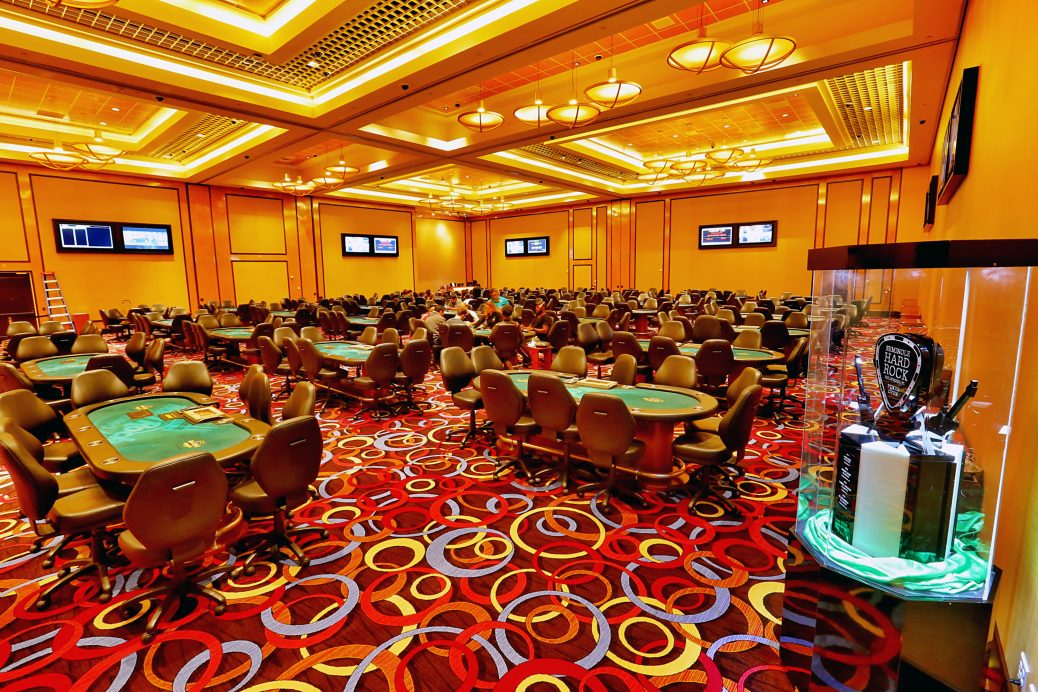
– All right, okay. Pre-flop?
– So what we got going on is the villain is first to act. It's an under-the-gun straddle, and the villain is first to act; he opens to $35—pretty standard open for a game. The hijack calls. I'm sitting in the small blind with . I usually tend to lean towards a squeeze there, but I wasn't really interested in playing a big pot out of position, so I just take the passive route and call. Straddle completes. So we're going four ways to the flop.
– Okay, pots $140 bucks.
– The flop comes , all Spades.
I check; straddle checks first to act; he bets $100 after tanking for about two minutes. The timing isn't really that big; he's slow all the time.
– All right, so he bets $100—the pre-flop raiser?
– Yep. Hijack folds; I call; straddle folds.
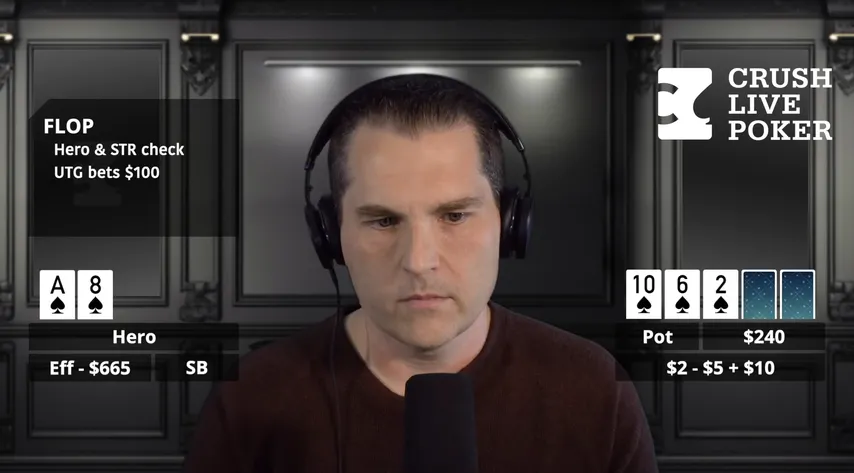
– So hijack folds; hero calls, and anyway, $340 to the turn.
– Yep. So I'm first to act in small blind again; check again.
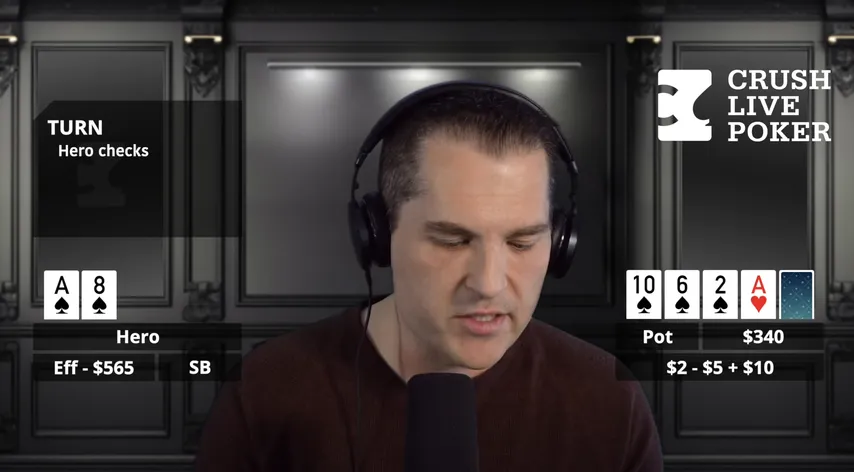
– Villain tanks this time a little bit longer—about three or four minutes—and then he jams for $405.
– Well that's not bad! Right? So hero in the small blind checks and UTG jams for $405 and obviously hero's going to snap-call here with the nuts!
– Yep! Snap-call, I throw one chip. Now I can't remember if I said "call" or not but I'm pretty sure I said "call" and then instantly flip over the nut flush.
– So you flip over your hand?
– Yep!
Okay now... this is where it gets interesting: the dealer takes $405 for me to match his stack and then takes my hand—mucks it with the entire board—and then takes the villain's hand and pushes the pot over to the villain.
But, we still have another card to go.
– So wait a minute—so you call with a single chip, you turn over your hand—now did you just out of curiosity say "call" as well or did you just flip in a single chip?
– I'm pretty sure I said "call," but I can't say 100% sure—I don't want to say I for sure did.
– So you flick in a single chip and you turn your hand over and then something happens where the dealer then takes your hand—the entire board—and then mucks your hand—all the cards—and pushes you the pot to your opponent?
– Yep—with my $405!
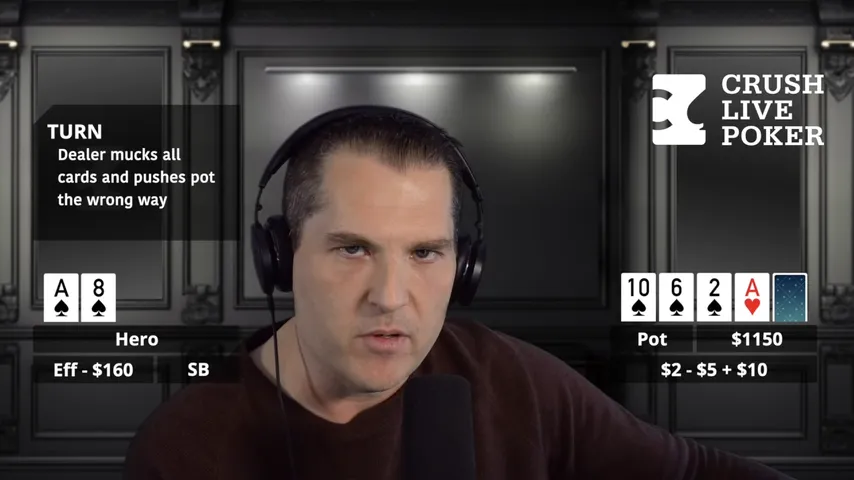
– Oh okay! That's where I was trying to get at—the fact that maybe the dealer thought you folded—but no! The dealer took your money! He took your $405 and gave it. Okay, so what happens then?
– Well, the dealer, you know, at that point, we're all in shock.
We're all kind of watching it go down, and I didn't say anything for a while because when he starts mucking it, I kind of just assumed—I'm sitting in the eight seat and the villain's sitting in the three seat—so I don't have the best view. But I just assumed that maybe the villain just was like, "Okay, I fold," like he mucked because he's dead, you know? And so that's what was happening.
But it's going down, and then the pot gets pushed in the villain's direction, and everyone at the table kind of all at once is like, "Whoa, whoa, whoa! What's going on? What's going on?"
Then the dealer looks over at me and says, "Oh crap!" and instantly calls the floor. He's like, "My bad guys! My bad! I made a mistake!" So he calls the floor over and starts explaining the situation. He's like, "You know, he flipped over his hand and I thought that he folded and I didn't see that he called." But I was like, "Well, he took $405 from me!"
– That was the thing—right? He took the money from you though!
Right! And it becomes this huge thing; the whole table is in chaos. Nobody's ever seen anything like this. And you can't rerun it because all the hands are in the muck.
– So did the dealer also take your opponent's cards too?
– Yes! He ended up taking them too!
– So he took your cards, mucked the board, and then took your opponent's cards and mucked them.
– Yep! He took it like a full fold; you know? It's like actions dead; he just did one of those..
– ..Sweeps everything in, alright. So I assume you called the floor over?
– Yep, yep. The floor was instantly over there because he realized—he knew instantly that he made a mistake. You know, it's late in the night and I think he was just on autopilot. It was just one of those things. But I mean it's a big mistake.
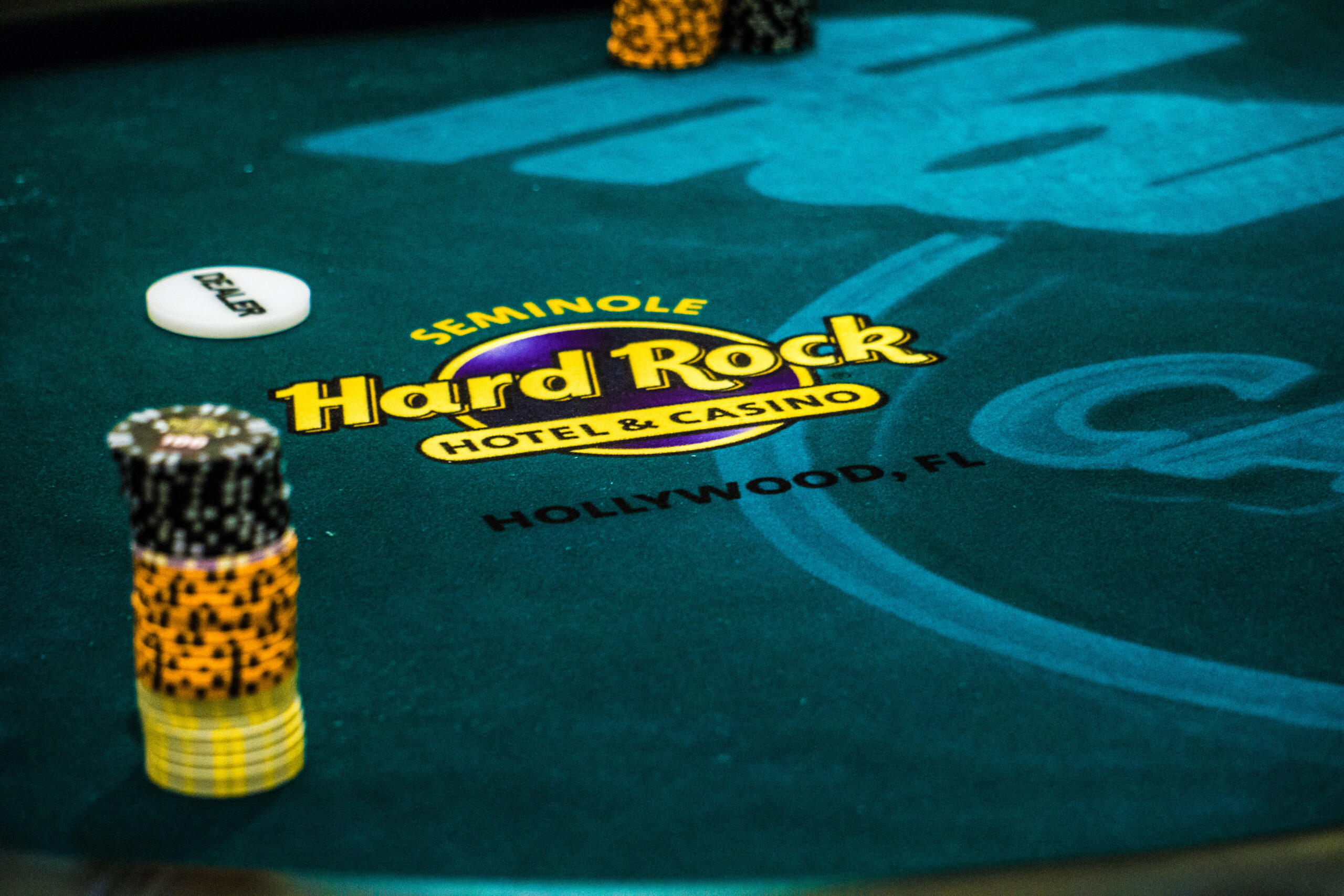
Anyways, the floor comes over and nobody's ever seen anything like it. They end up having three floor guys come over and in their initial ruling they have both of us take back our $405 and then they take the pot before the $405—so all the action from pre-flop and flop—and put it aside in the well.
And this is after about 20 or 30 minutes of arguing.
– What's the arguing about? Who is arguing about what to do?
– Okay, because the villain—you know everyone's like, "Okay just say your hand was dead! Just say you were dead! Please just be dead!" And he's like, "No! No! I had a set! I had a set of deuces!"
And so that's where it gets kind of crazy. You know?
A little background on this villain: a couple rotations earlier he got called out by a different dealer for trying to pull back his blinds after he folded and after the pot got dealt—like pushed to him—and while talking with the floor he held onto the pot; he stacked up all the chips and held onto the pot for about five minutes—in his possession—and everyone at the table is like, "What are you doing? Put the pot back! Put the pot back in the middle! That's not yours!"
So this is like the chaos of the whole situation—all of this is compounding—and you know there are arguments about what do we do? What do we do? Because everything's in the muck.
– But obviously, people told the floor that you held though and it was tabled, right?
– Yeah
Bart's Solution and the Floor's Ruling for the Pot
– All right! I would tell the floor, "Okay, let's reconstruct the pot. Let's put the board back out; we're all in and deal the river card out. Deal the river card out, and if the board pairs, he wins the pot. If not, I win the pot." Or you could maybe decide between the two of you to do an equity chop where you get 80% of the total pot, you know what I'm saying?
– But that's the fun part about it, Bart! When it did happen, that's exactly what I recommended. I was like, "I don't care! I'll give him the benefit of the doubt that he has a set; you know? I'll give it to him." Because even if he has a set, I'm an 80% favorite, so I'll take it! I was like, "Deal it out! Reset the board and we can deal the river!"
And they did not like that solution. They were like, "No, we can't do that because we don't know what he has."
– Well, no! People are saying, "You can't create the villain's hand though."
Okay, well I'm giving—the people in the live chat are saying—I'm giving the villain the best-case scenario! It doesn't matter what set he has, right? The best-case scenario for him is that he has a set. So he's not drawing dead; we'll play it like he has a set! What other recourse is there? I'm not saying I want the whole pot; I'm not going to argue with the guy and say, "You never had a set; you're an angling scumbag!" I'm like, "I'll give you a f***ing set!" I don't know how else... I'm going to give the guy a set!
– Exactly! And the floor doesn't like that. They're like, "We need to go talk to our director." So they go off for two hours, and during this two hours, I offer the villain an equity split. I'm like, "Dude, let's just do it 80/20; like this is fair!"
Then he starts to play dumb—he's like, "What do you mean 80/20? What does this mean?"
– Oh boy!
– He's a young Euro kid; he's a reg.
– Well wait a minute—he's a young Euro kid and he's trying to play dumb with you? "What do you mean 80/20?"
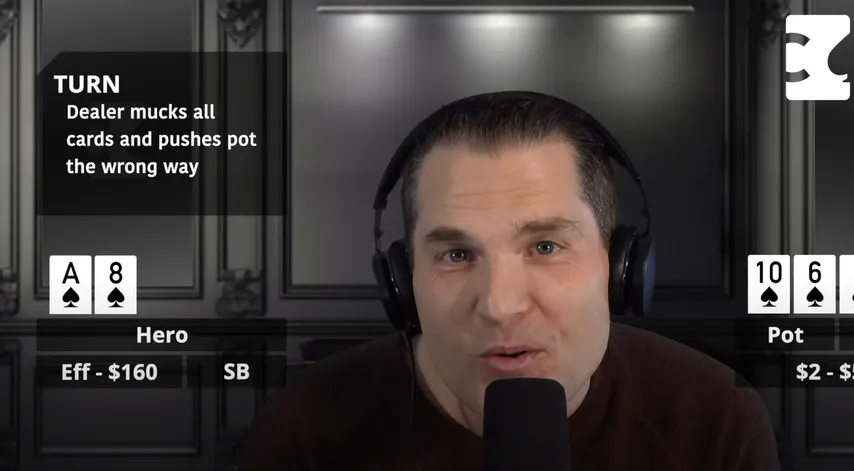
– And I'm like, "Dude, you're a smart kid! Don't tell me you don't know what 80/20 is! Don't tell me you don't know what equity is if you have a set!"
– This guy sounds kind of like an angling scumbag. But then at that point you're like, "All right, I can't make a deal with this guy." Then I would still try to go to the floor and be like, "Why can't you just run the f***ing river out? Are they going to kill the entire hand?"
I mean it's so weird right? This is the thing with floor guys and stuff: there are some good ones. I'll actually go to my buddy Allen who works in Houston; he works for TCH. But when I see Matt Savage interact... there needs to be some nuance or flexibility. You have the nuts on the turn; give your opponent the best-case scenario! But you can't just chop the pot in half if that's what they're going for—that's not fair to me when I hold the nut flush!
– Well right—that's what they end up doing! They come back two hours later and give their decision: they end up splitting the pot.
At that point I just flipped out a little bit; I got really angry—I got really upset because the floor guy came to me and part of the reason they went with their decision was because I waited 13 seconds to speak up. They were like, "If you would have spoken up earlier we would have changed it."
I was like, "You're telling me if I spoke up in one second and the dealer still mucked everything—that's going to change your decision?" Because basically, they said that the villain is in the right because it's the player's duty to protect their hand. So they end up chopping it.
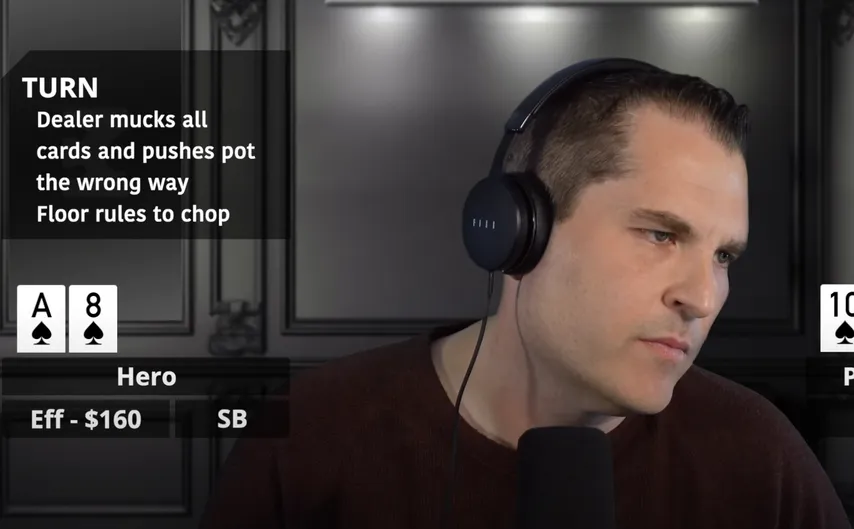
The floor guy is talking to me afterward and he's like, "Yeah, we talked to the director and we had to make—I made three phone calls. I had to talk to some high-stakes players and this is just the conclusion we came to."
– "Talked to some high-stakes players" – what does that have to do with anything?
If you're relaying this whole thing correctly to me, that last part where you said, "Well, it's up to the player to protect his hand," but your hand—I guess the only difference is because the river's not out. I was going to say, like, there are precedents for this though because on the river when you table your hand, you don't need to protect your hand. Once the hand's tabled and some people see it, if the dealer goes and mucks it, that can be corrected. That can be corrected because your hand's tabled.
I guess this is different because the hand's not over; the last card isn't dealt. So if you table your hand and allow the dealer to scoop in your hand, that could be a definition of protecting it. I just—I hate—I don't know. Maybe they're bound to that in some way. I just wish there would be some way for a higher-up to actually look at the exact situation and come to this conclusion. Again, I don't think casinos get involved with equity chops, but I feel like why can't they just run the river out though?
It’s a very strange one.
I do remember too that they made a rule about this at the WSOP because there was a—I think it was a female player—this was like 15 years ago—that literally had her hand mucked. She called, and then you know they were all in pre-flop and the dealer took her cards during the WSOP main event.
They put a rule in that you cannot have your tournament hand mucked away in a tournament. I think what would happen now is she would lose the pot but she wouldn't lose the call amount; they would give her the call amount. Obviously, I'm just relaying this because of the cash game that they put this rule in.
But that's the craziest thing I've ever heard! So you just ended up having to chop the pot with the guy?
– Yeah! I'll give you one more thing: this guy for the whole two hours—we're pretty much arguing—and I had to get myself under control. But when the floor comes back and they give their ruling—you know how you chop the pot? It's an uneven number; the extra goes to the button. At this point we're three dealers after the original dealer and he's like, "Okay, well I don't know who to give the extra to; I don't know who had position."
And this guy has the audacity—the villain—to be like, "I get it! I get it! It's mine! I had position!" I'm like, "Oh my God!"
I wasn't the only person arguing; the whole table was arguing with this guy. It was bad.
– Well, I mean if there's a lesson—just to wrap this up—as a lesson learned: first of all, I've always said I've hated the one-chip call.
Whenever you have the nuts and somebody moves all-in, I think it has to do with the fact that a guy pump-faked and moved all-in—like he moved all-in—and then a guy with the nuts—in your situation—called too quickly. Then the guy's like, "Oh! I didn't release my chips!"
Right? Whenever you have the nuts and somebody moves all-in, just take a breath and say "call" and then watch everything! Personally, I'm not trying to victim-shame you but I would never have let the dealer muck my hand. That comes with experience.
But it's just unfortunate and disappointing that they couldn't come up with a better resolution than that. I don't know what exactly they would do; like I said I'll try to look and ask some people in the industry about what they would have done.
But I appreciate you relaying the story.
– Yeah, I appreciate it! I appreciate your time.
Read Read